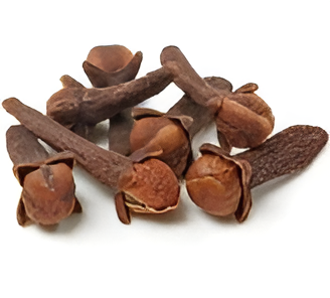
The Versatile Spice: Clove
Clove, scientifically known as Syzygium aromaticum, is a flower bud from the clove tree, native to the Maluku Islands in Indonesia. This aromatic spice has been cherished for centuries for its unique flavor and numerous health benefits. From culinary applications to medicinal uses, clove stands out as a versatile ingredient that has made its way into various aspects of daily life.
Culinary Uses of Clove
Clove is widely used in cooking, thanks to its strong, warm flavor and aroma. It is a key ingredient in many spice blends, including garam masala, chai masala, and pumpkin spice. The spice is often found in both sweet and savory dishes, enhancing their taste profile.
- Savory Dishes: In Indian cuisine, cloves are used in biryanis and curries, where their bold flavor complements the richness of meats and vegetables. The spice is also a crucial component in Middle Eastern cooking, featuring in stews and rice dishes.
- Beverages: Clove is commonly used in spiced teas, particularly chai, where it adds warmth and complexity. It’s also used in hot apple cider and mulled wines, particularly during the fall and winter months.
- Baked Goods: In Western cuisine, clove is often included in spice cakes, cookies, and fruit pies, imparting a sweet and aromatic flavor. The combination of cloves with cinnamon and nutmeg is particularly popular in holiday baking.
- Preservation: Historically, clove has been used for its antimicrobial properties, making it a popular choice for pickling and preserving foods.
Health Benefits of Clove
Beyond its culinary appeal, clove is revered for its health benefits. The spice contains eugenol, a compound known for its analgesic, anti-inflammatory, and antioxidant properties.
- Digestive Health: Clove is known to improve digestion and reduce bloating. It can stimulate the production of digestive enzymes, aiding in the breakdown of food.
- Oral Health: Due to its antibacterial properties, clove oil is commonly used in dental care. It can help alleviate toothaches, freshen breath, and fight oral infections.
- Anti-Inflammatory Properties: The eugenol in clove has been shown to reduce inflammation in the body. This makes clove beneficial for conditions such as arthritis and other inflammatory diseases.
- Immune System Support: Clove is rich in antioxidants, which help boost the immune system. Regular consumption may aid in protecting the body against various diseases.
- Respiratory Health: Clove can help alleviate respiratory issues, such as coughs and colds, by acting as an expectorant and clearing mucus from the airways.
Clove Oil: A Powerful Essential Oil
Clove oil, extracted from the flower buds, leaves, and stems of the clove tree, is a powerful essential oil with numerous applications.
- Aromatherapy: In aromatherapy, clove oil is valued for its warm, spicy scent, which can help reduce stress and anxiety. It is often used in diffusers and massage oils.
- Topical Applications: Due to its antiseptic and analgesic properties, clove oil can be applied to minor cuts, bruises, and insect bites. However, it should always be diluted with a carrier oil before application.
- Insect Repellent: Clove oil is effective in repelling insects, making it a natural choice for homemade insect repellents.
- Culinary Uses: Clove oil can also be used in cooking, but it is potent and should be used sparingly to avoid overpowering dishes.
Cultural Significance of Clove
Clove holds significant cultural importance in various societies. In ancient times, it was highly valued as a trade commodity and was often referred to as “black gold.” Its rarity and unique flavor made it a symbol of wealth and luxury.
- Traditional Medicine: In traditional Chinese and Ayurvedic medicine, clove has been used for centuries to treat various ailments, from digestive issues to respiratory problems. Its historical use underscores its importance in natural healing practices.
- Religious Ceremonies: In some cultures, cloves are used in religious rituals and offerings, symbolizing purity and protection.
- Festivals and Celebrations: Clove is often associated with festive occasions, particularly in winter holidays. Its warm aroma is reminiscent of comfort and celebration.
How to Use Clove in Your Kitchen
Incorporating clove into your cooking can elevate your dishes significantly. Here are some tips on how to use this spice effectively:
- Whole vs. Ground Clove: Whole cloves retain their flavor longer than ground cloves. For the best flavor, use whole cloves and grind them just before use.
- Infusion: To extract maximum flavor, cloves can be infused in liquids. For example, simmering cloves in milk or broth can create a flavorful base for soups and sauces.
- Cooking Time: Whole cloves should be added early in the cooking process, as they need time to release their flavor. Ground cloves, on the other hand, can be added later to prevent their flavor from becoming too overwhelming.
- Storage: Store cloves in a cool, dark place in an airtight container to preserve their flavor. Whole cloves can last for several years, while ground cloves have a shorter shelf life.
Conclusion
Clove is more than just a spice; it is a multifaceted ingredient with a rich history and numerous benefits. Whether used in cooking, as an essential oil, or in traditional medicine, cloves add value in various ways. Their strong, aromatic flavor can enhance dishes, while their health properties can support overall well-being. With such versatility, it’s no wonder that clove remains a staple in kitchens and medicine cabinets around the world. Whether you’re enjoying a warm cup of chai or incorporating it into your favorite recipes, clove is a spice worth celebrating.